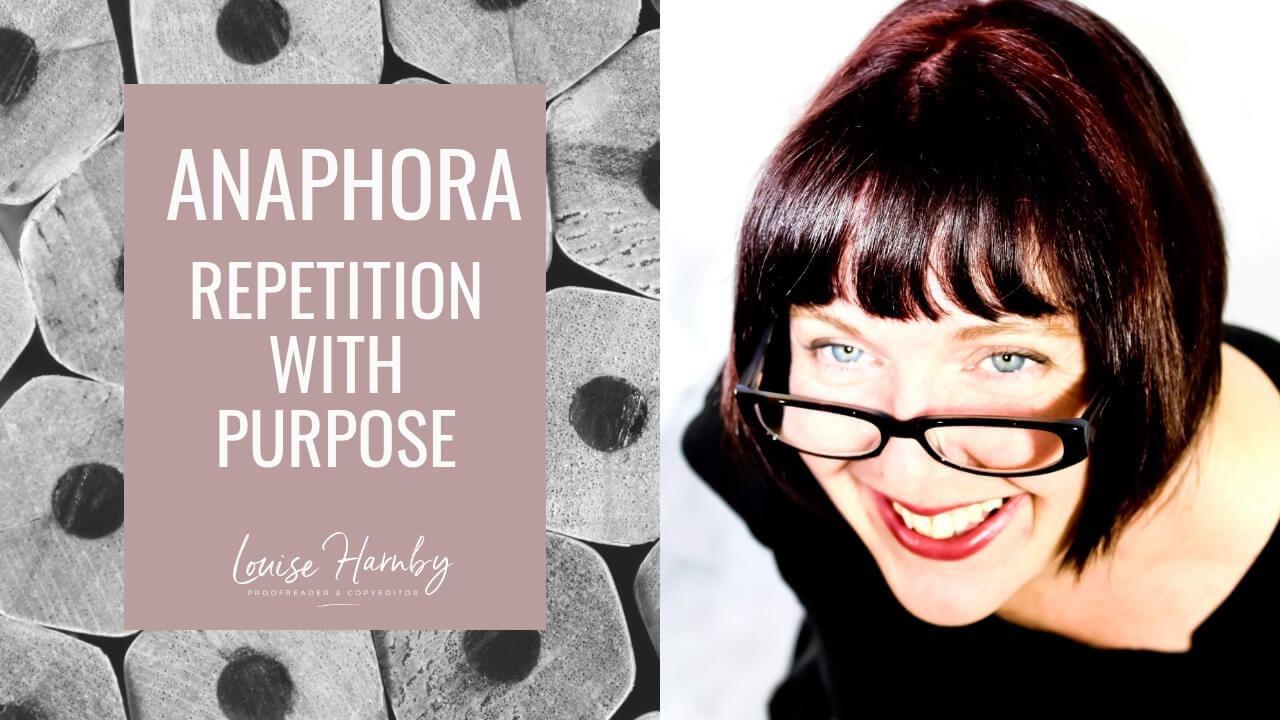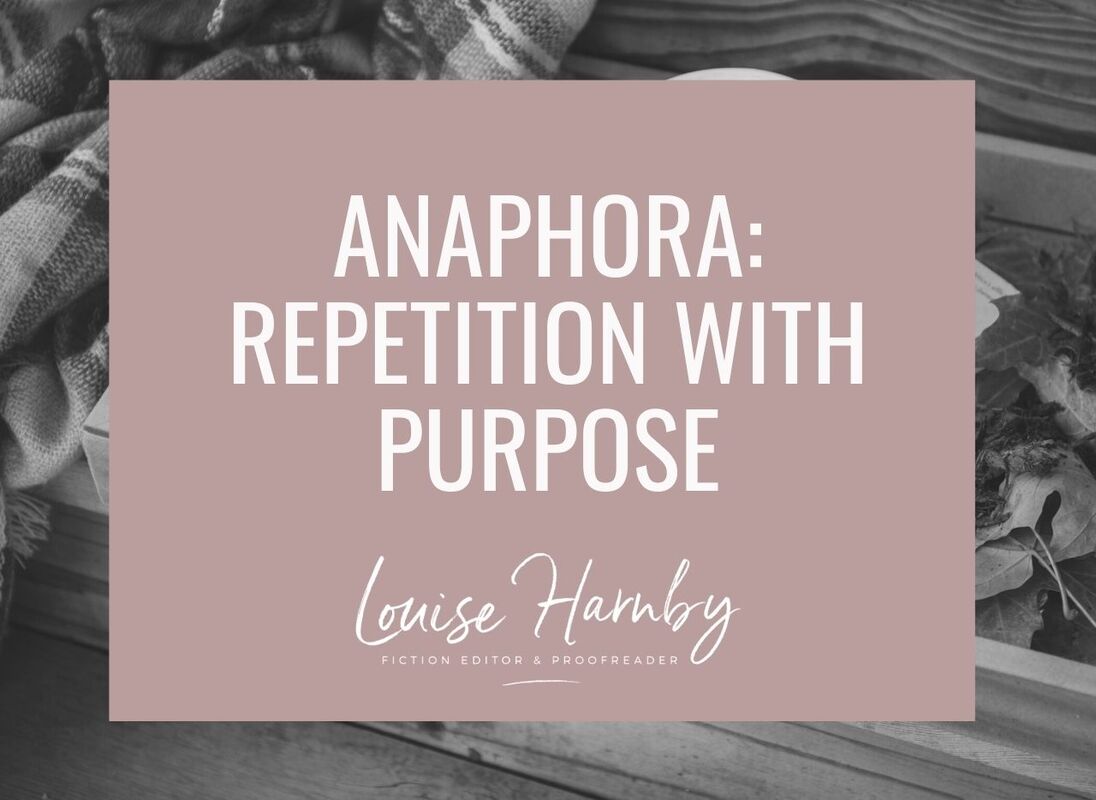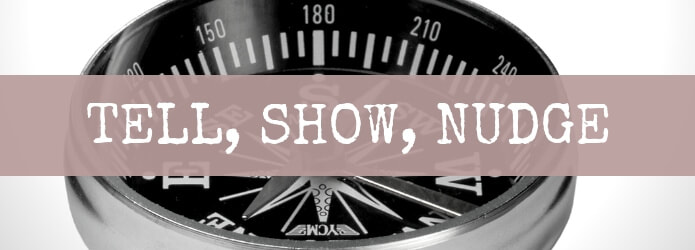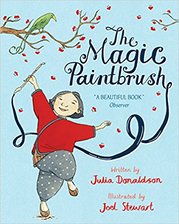|
Repetition of key words and phrases in narrative and dialogue can make the reading experience laborious. There are times, however, when saying something more than once works beautifully. It’s time to talk about anaphora.
What is anaphora?
Anaphora is the deliberate repetition of words or phrases at the beginning of successive clauses for artistic effect. This literary device is often seen in poetic works and in speeches. It’s also common to see it in children’s books that have a rhyming element. Anaphora – rhythm, emphasis and emotional back doors First, repetition of words affects rhythm, which can evoke mood: monotony, boredom, excitement, frustration. Emotions transform a story from just words on a page to a reader experience. Plus, rhythmic writing is memorable and digestible, which helps your reader get under the skin of your novel. Second, anaphora can be used for the purpose of emphasis. We notice repetition and, while it can jar when not used purposefully, deliberate repetition helps your character or narrator to drive a point home. Third, anaphora is one of a range of tools that will help you keep your writing tight but emotionally rich. Repetition is used purposefully so that the reader understands what the character is feeling, but via a literary back door.
Anaphora and your fiction’s narrative
Reading isn’t just about ingesting words. It’s about experiencing a sense of place and mood. There are different ways in which a writer can help a reader engage with a character and their story. 1. You can tell them what a character’s feeling:
TELLING
Melanie felt angry and bored. She’d been sitting in the jobcentre for forty-five minutes, had watched the same old faces passing back and forth, but as usual her name hadn’t been called. 2. You can show them what’s being felt with action beats:
ACTION BEATS
Melanie scowled and tapped her fingers on the arm of the chair. The same old faces had passed back and forth but forty-five minutes had passed and no one had called her name. 3. You can nudge them by playing with the rhythmic structures, of which anaphora is one:
ANAPHORA
Forty-five minutes had passed. Melanie waited but no one had called her name. Same old faces, same old silence, same old story. None is wrong or right but relying on only one could render your prose dull. Experimenting with different techniques can enrich your narrative.
Anaphora and your fiction’s dialogue
We often use anaphoric constructions in everyday speech, and the fiction writer seeking to mimic that naturally shouldn’t fear using them in dialogue. Here are some examples:
EXAMPLES
Note how the repetition adds emphasis and heightens the emotion. Take example (1). The anaphora helps us to feel the character’s frustration and hurt. We don’t need an action beat or dialogue tag to tell us this. There’s no need for the narrator to interject with an explanation. We don’t even need to use italic to nudge the reader towards where the emphasis should be placed in our mind’s ear. The anaphoric speech does it all for us. Here are examples of how the passage might look with extraneous information:
REDUNDANT ADVERBIAL DIALOGUE TAG
‘Every time you mention his name, every time you pick up that photograph, every time you recall some place you visited together, you’re telling me I’m second choice,’ said Ash, frustrated. REDUNDANT NARRATION Ash felt frustrated and hurt. ‘Every time you mention his name, every time you pick up that photograph, every time you recall some place you visited together, you’re telling me I’m second choice.’ REDUNDANT ITALIC EMPHASIS ‘Every time you mention his name, every time you pick up that photograph, every time you recall some place you visited together, you’re telling me I’m second choice.’ Used purposefully, anaphora can help writers declutter their dialogue. Readers don’t just focus on the words in the conversation: they also do their own emotional imagining. That can be a more rewarding way of engaging with the story than being told what the character must be feeling. Anaphora, memorability and overuse Anaphoric constructions are rhythmic, which makes them memorable. That’s why politicians employ them in their speeches when they’re trying to rally the masses, and why children’s book authors use them to help young readers engage with their stories. Look how Julia Donaldson uses it to gorgeous effect in The Magic Paintbrush: Still, in a novel, that memorability can work against the writer. If you overuse deliberate repetition, it could become an irritant instead of an engagement device. Readers will view it as a writing pattern, not a writing tool. As with any literary device, think about peppering rather than littering your prose with anaphora. That way, you maximize the impact. It becomes just one literary device among others that makes your prose interesting. When repetition isn’t a literary device Sometimes an author can get so carried away with writing that they don’t notice they’ve repeated words. This can make the prose clunky to read. After your first draft, revisit what you’ve written. You might even like to read it out loud or play it through an onboard narration tool on your computer. Anaphora is deliberate repetition. It serves a purpose – to evoke emotion, drive emphasis, or nudge readers towards their own emotional imagining. If multiple uses of a word or phrase aren’t serving artistry, recast the sentence.
ACCIDENTAL REPETITION
Jim sat in the big black leather office chair behind a large walnut-veneered office desk of the director’s office at PharmaCo HQ. It was his second home. POSSIBLE RECAST Jim sat in a large black leather chair behind a walnut-veneered desk. This was PharmaCo’s managing director’s office and Jim’s second home. ANAPHORA Jim sat at the desk in his office … the office that had been his second home for three years. The office where he’d sacked half the PharmaCo workforce just to keep the company afloat. The office that held enough sordid secrets to bury anyone who stood in his way. Summing up Anaphora is one device among several that has a place in the novelist’s toolbox. I’m not advocating removing description or action beats – not at all. Rather, I’m suggesting you might like to experiment with anaphora here and there in your fiction. If you enjoyed this post, check out my other articles on sentence-level mastery.
Louise Harnby is a line editor, copyeditor and proofreader who specializes in working with crime, mystery, suspense and thriller writers.
She is an Advanced Professional Member of the Chartered Institute of Editing and Proofreading (CIEP), a member of ACES, a Partner Member of The Alliance of Independent Authors (ALLi), and co-hosts The Editing Podcast.
10 Comments
10/12/2018 04:50:46 pm
Excellent post, Louise! Needed this guidance today. Thank you! 😊
Reply
Louise Harnby
10/12/2018 04:55:36 pm
Glad my timing worked out, Felicia!
Reply
11/12/2018 02:04:03 pm
Excellent information, Louise. Repetition with purpose. I'm sharing via Facebook.
Reply
Louise Harnby
11/12/2018 03:41:36 pm
Thanks, Kathy! Glad you enjoyed it!
Reply
Lindsey Russell
23/12/2018 02:29:32 pm
Well I never! I thought I was pretty up on literary terms but I'd never heard the 'name' of this one before - though well aware of the actual 'device' and used it on occasion for emphasis.
Reply
Louise Harnby
23/12/2018 04:44:27 pm
Only discovered the term myself about 12 months ago! It rolls off the tongue beautifully, I think!
Reply
24/12/2018 02:12:21 am
I love the examples you gave. Thanks for a very useful post. I will be posting the link on my blog.
Reply
Louise Harnby
27/12/2018 05:15:43 pm
Thank you, Rosi! So glad you enjoyed it. I think my favourite example was the real one from The Magic Paintbrush. I love Donaldson's books and rue the day my daughter grew up!
Reply
22/11/2019 02:59:32 pm
Enjoyed this post, Louise! Afterwards, when I began reading Little Dorrit, I immediately noticed that Dickens used anaphoric construction quite a lot. Here are just a couple of examples from chapter one:
Reply
Louise Harnby
22/11/2019 03:13:45 pm
Those are brilliant examples, Amy! Thanks so much for sharing them. Hope Chicago is quieter now that the summer is over! I was talking to someone just the other day about the cicadas. Thank you for being such a wonderful host!
Reply
Leave a Reply. |
BLOG ALERTSIf you'd like me to email you when a new blog post is available, sign up for blog alerts!
TESTIMONIALSDare Rogers'Louise uses her expertise to hone a story until it's razor sharp, while still allowing the author’s voice to remain dominant.'Jeff Carson'I wholeheartedly recommend her services ... Just don’t hire her when I need her.'J B Turner'Sincere thanks for a beautiful and elegant piece of work. First class.'Ayshe Gemedzhy'What makes her stand out and shine is her ability to immerse herself in your story.'Salt Publishing'A million thanks – your mark-up is perfect, as always.'CATEGORIES
All
ARCHIVES
July 2024
|
|
|
|




















 RSS Feed
RSS Feed





